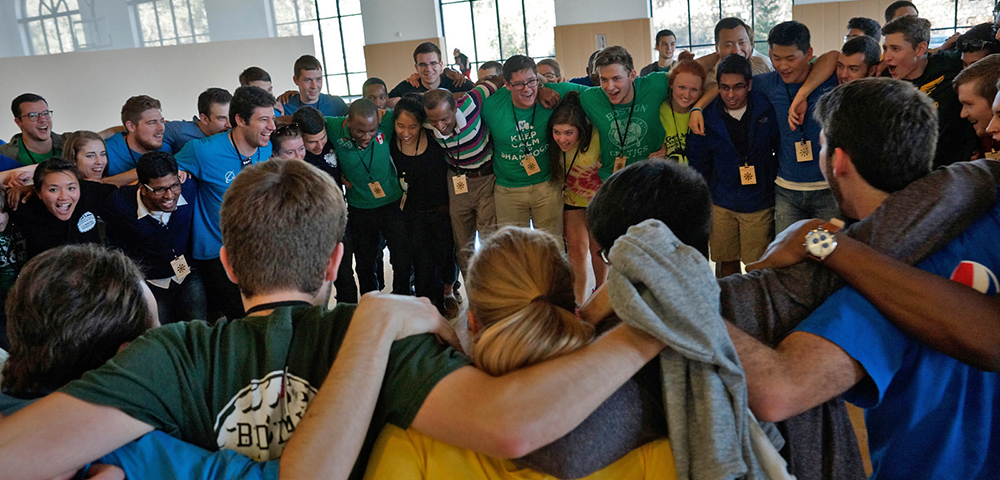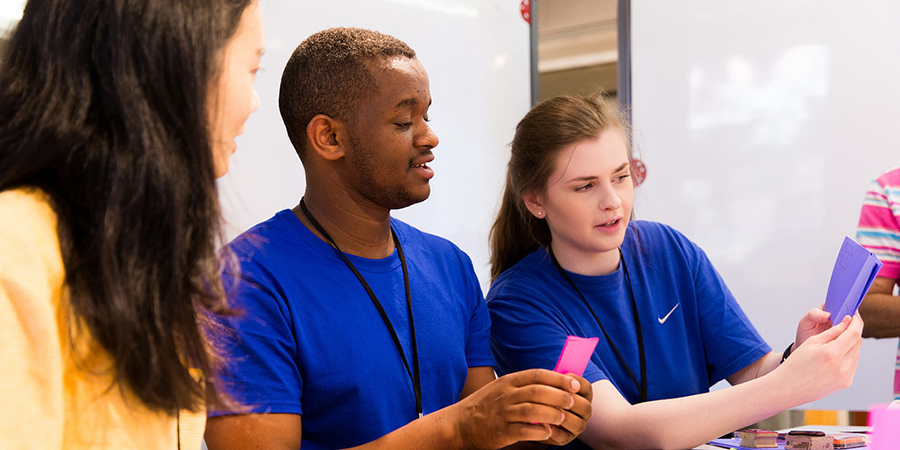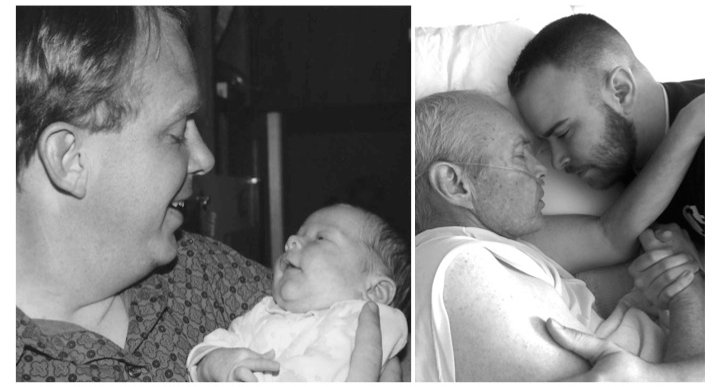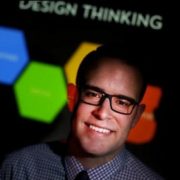
By the UIF program team (Leticia, Humera, Katie and Laurie)
The University Innovation Fellows program reflects the voices of students and faculty around the U.S. and the world. We felt it was important to reinforce this program’s core values in light of the Trump administration’s executive order on January 27 that impacts the immigration system of the United States. This program is not a political organization, and we continue to respect the diversity of opinions and political views of our community.
The heart of the University Innovation Fellows program is strength in human diversity of all kinds: opinions, ideas, backgrounds, life experiences and more. Sure, a problem can be solved by one group of very similar people, but the grand challenges that face our planet and our people are best addressed from different angles and using diverse sets of skills and ideas. Entrepreneurship, innovation, creativity, and design thinking require interdisciplinary and intercultural collaboration. This is why the University Innovation Fellows program brings together students and faculty from different schools, majors, religions, economic backgrounds and countries to learn to be changemakers in higher education. Fellows and their faculty mentors create experiences to prepare all students for the world outside academia, which thrives on and values diversity.
We believe that the actions taken by the Trump administration last week will put our education system, our country and our world at risk, not to mention the impact that the executive action will have on countless members of our community. Our Fellows and Fellows in training live in eight different countries including the U.S. Many of them hold dual citizenships, have green cards, or have families in countries outside the U.S. And many, many more of them have family members, student colleagues, friends and faculty mentors who will be impacted by this administration’s actions. We must continue to deal with the risk of terrorism, but we must not lose our country’s valued diversity along the way.
Stanford University has published a statement in support of our international and undocumented community that reflects our program’s concerns and priorities. The Association of American Universities, of which Stanford University is a part, has also issued a statement.
There are many actions each one of us can take. At the very least, one step we encourage you all to take is to practice empathy for others. Empathy, the awareness and understanding of the feelings and emotions of other people, is a core value in design thinking. It is included in the training of our Fellows and drives their actions. Whatever your level of support for the current U.S. administration, we all need to work together to solve our problems; nothing will change if we remain divided. You — our Fellows and faculty change agents — are poised to start making this change. This is the ultimate design challenge. How might we better understand the lives of those whose beliefs are so different than our own? How might we create opportunities for connections between opposing sides?
To continue with the practice of empathy, we are sharing some personal perspectives from members of our team and Fellows to help our community understand the diverse group of people who have been impacted:
Humera Fasihuddin, Co-Director, University Innovation Fellows Program
I’m a New Yorker, born and raised. My parents were born and raised in India. Growing up, I didn’t appreciate that my parents came to the America with nothing. They both worked two jobs and pursued Master’s degrees to get ahead. I didn’t appreciate how hard they worked to allow me to get a 4-year degree from a prestigious institution, from which I graduated debt-free. I didn’t appreciate the plan my parents had for me, namely going along with an arranged marriage and all the other expectations they had for their eldest daughter. Instead, I wanted to forge my own path rather than assume the role I was supposed to fill.
To pursue this dream, I started my career from the ground up in a place where no one knew me. I learned the lessons of life: working hard, saving for a home, marrying into a working class white-American family, becoming a working mother of three, leaning in to workplace inequities, and supporting a spouse’s small business through the recession. I chose an entrepreneurial path because I wanted to lead a free and independent life.
America was founded by inspired individuals turning their dreams into reality. America proved to be the land of opportunity for my parents and for me. Yet, young people in America still hesitate in seizing their American Dream. Some people believe the American Dream is dead and that upward mobility just doesn’t exist, but the I believe those opportunities still exist and are ours to seize. That is the motivation behind my work in the University Innovation Fellows program. If we can pair the youthful idealism of America’s college students with entrepreneurial knowledge, skills and attitudes, we can solve our world’s big problems. And, it’s working. Fellows are reaching thousands of peers on college campuses across America with that same message. They are working with faculty and administration to change higher ed and instill an entrepreneurial mindset in all students. This generation of students will go on to be leaders, problem solvers and change agents in their careers.
My parents’ immigrant hustle and pursuit of the American Dream inspired me to bring that to young people in America, to help them realize that struggle and poverty is not just in the developing world, to be seen during semesters abroad and service learning trips. The struggle is all around us, from urban centers to agricultural communities. It is down the street from all of us. And it is our opportunity – and moral obligation – to solve the problems that are closest to home by honing our entrepreneurial mindset and doing something about it.
Leticia Britos Cavagnaro, Co-Director, University Innovation Fellows Program
I have lived in the U.S. for 13 years, first as an international student on a F1 visa, and now as a green card holder. When I arrived at Stanford University from my home country of Uruguay, I marveled at the diversity of students and faculty, some from the countries now banned from entry to the U.S. I initially didn’t give much thought to it because the spirit of inclusion was so ingrained in the culture. As I look back at the breadth of ideas and perspectives I was exposed to, I realize how much richer my experience was because of this diversity. I’m extremely saddened that the current political climate is threatening this core value. There are students who are presently trapped in a legal (or physical) limbo, whose chance of finishing their studies is at risk, who will be unable to visit family abroad, and who are justly overcome by fear about an uncertain future. There are also American students whose right to be on campus is not at stake, but their access to an education based on compassion and inclusion is.
Upon getting my PhD, I could have returned to my home country, as many peers did, bringing back the knowledge, human connections to build collaborations, conviction that it is possible to change the world, and immense gratitude to the U.S. for the opportunity. I chose to stay for two compelling reasons: along the way I met my wonderful husband of 8 years, who happens to be an American citizen; I was also offered a job to help create a center – funded by the National Science Foundation – to foster innovation and entrepreneurship education in universities across the U.S., an opportunity of such potential for impact that I could not pass up. Out of the center came the global student movement that is the University Innovation Fellows, currently reaching many countries, including Uruguay. I’m grateful each and every day to be able to support such a community of thoughtful, inclusive, creative and empathetic young people who will not be stopped on their quest to create a better education system for all. They give me hope for a brighter future.
Katie Dzugan, Network Development Director, University Innovation Fellows Program
America is the “land of the free, home of the brave” and the “melting pot” that was refuge to many immigrants yearning for different types of freedoms. These immigrants represented different races, cultures, religions, traditions, and more. They seized the opportunity to come to America to build a better life for themselves and a better future for their families. This is the ideal our country was built upon: the opportunity to be and live better. Yet here we are, in 2017, shutting a group of people out of our country simply because of where they’re from and what religion they follow.
As George Bush stated after 9/11, “The enemy of America is not our Muslim friends. It is not our many Arab friends. Our enemy is a radical network of terrorists and every government that supports them.” We do not need to fear those with different beliefs than us. We need to embrace them. I don’t even like the fact that I just quoted George Bush, but I did, because as the leader of our country during that time, he at least took a stance to help America understand the difference and lessen the hatred toward our Muslim friends inside and outside of our country. Now we have a leader of the free world doing the opposite, telling our Muslim friends with legal documentation that they cannot come home. Which makes only some of us truly free, doesn’t it?
I’m extremely proud of the people who have been standing up: all those who marched in unison during the Women’s Marches held across the world and the judges and lawyers, politicians, and protesters at airports, who are fighting against this executive order. They inspire me into action. How can we all be more brave to continue to fight for the things we believe in?
I am living a life of opportunity in America to freely make my life my own and accomplish all that I have so far – whether I created opportunities for myself or an opportunity was presented to me – and I will continue to do so by seeking different opportunities throughout my lifetime. With this administration, it’s heavily reinforced as a privilege that I can never take for granted. I am second-generation American born, from a white (European decent) middle class family in the suburbs of Chicago. I wouldn’t be here if my grandparents didn’t take the opportunity to live better in America. I wouldn’t have the worldwide perspective if I didn’t grow up in a diverse area, learning about all types of people, how they live and their culture and traditions. We cannot close the doors of our “melting pot” because this is what makes America unique and strong. We need to keep standing up for what we believe in, and to me, today, in this executive order situation, that’s human decency and respect.
Laurie Moore, Communications Director, University Innovation Fellows Program
It’s easy to hate someone you don’t know. Once you get to know a person – her history, culture, family, struggles, joys, passions, fears – you can begin to understand why she is who she is, and why she does what she does. I’d like to tell you about myself, as a first step. I am a female, straight, Caucasian U.S. citizen of European descent from an educated middle class family in central Pennsylvania. I’m an only child who graduated from college without debt and entered my career without hardship. I work for a prestigious university, as does my spouse. I enjoy baking creative pies and visiting national parks. I hate ice skating. I’m afraid of ghosts even though I don’t believe they exist. I have pizza in my fridge, blankets on my bed, and faith that everything will work out somehow. Mine is a privileged life. But my life has been filled with family, friends, colleagues and mentors who haven’t shared my privilege, and whose lives have been filled with struggle. I’m a more colorful, passionate, and useful person as a result of my relationships, and I work to make sure that others are given the same opportunities, rights and respect that I was.
I don’t believe that one political party is simply right and the other is simply wrong. I also don’t believe that judging an entire group of people based on their religion or country of origin will fix the problems the U.S. is facing today. We’re turning away people in need, and these same people have great potential to contribute to our society, economy, culture and understanding of ourselves as humans.
One of the greatest challenges our country faces is that we don’t try to (or fail to) understand one another. Once we get to know the people we disagree with, or the people we turn away from our borders, they’re no longer flat caricatures – they’re real people, and we can no longer ignore or dismiss them. Then we can begin to work together to solve the problems that impact our country. Let’s start with empathy< love, and respect for our fellow humans. I told you who I am. Tell me who you are. Let’s talk and figure this out.
Hoda Ganji, University Innovation Fellow, PhD student, University of Wisconsin Milwaukee
I am Hoda. I started studying for my PhD in Architecture at the beginning of Fall 2015. That was the time when I moved from Iran to the US. During the last 1.5 years, I have made so many good friends, both American and International. What I observed was that a friend is a friend, a human is a human, no matter where they come from. I have experienced joy, happiness, love and friendship with all these people. Race was never an issue for me as an international student. Race was never an issue for the people I daily met either. It was only last week that suddenly race turned into an issue. I was hated but I don’t know why.
If you want to know more about me, here it is. I am from an educated family. My mother taught at high school and my father was a professor in a medical university; both are retired now. I am doing research on building envelopes. I don’t have much free time; but when I do, I enjoy occasionally running, playing volleyball, watching movies, listening to music, making friends and hanging out with them.
Fortunately, I visited my family during Christmas. I came back only two weeks ago. At the airport, I told them that I will visit them again in 6 months, and that they can visit me whenever they wish. I thought they would feel so much more relaxed once they see the peaceful place where I live. It was only one week later that all that dream vanished into the air. Now, I am not sure when I can see them again. I am here, trying to focus on my study, trying to avoid hatred, trying to live peacefully.
Mahmoud Khedr, University Innovation Fellow, Undergraduate Applied Psych Student, City College of New York
Saturday night, a few hours after the administration put out the news about the executive order on immigration, I received a message from Ian Howe, a professor, a champion for entrepreneurship and innovation, and a dear friend at the City College of New York. He said, “You represent the largest university regents in the country. People are waiting for YOU to speak. Great leaders are great communicators. Mahmoud, it’s on your young shoulders. Rally your Fellows from around the country and present a message.” I’ve been comforted to see the support and stories of so many Fellows, especially from the awesome people who created and are running this program.
At 11 years old, I came to the United States with my family from Egypt hoping to have an opportunity that many back home had wished for. As an immigrant and a proud Muslim, most of my years in the United States certainly have had their ups and downs – from new friendships and great learning experiences, to obstacles and hard times. I experienced years of bullying because of my religion in high school – and the events of January 27 are not going to help make sure that others don’t go through that.
Like many people in our community, what is happening now is really personal to me. The truth is that after being here for more than 8 years, I only recently got my green card – I am still not a citizen. Half of my family, including my mother and siblings who are only on a visa, are back home in Egypt and might not able to come back for a while.
At this time, I echo that our individual roles in our communities is to begin by understanding and empathizing with each other. While you may not be directly affected by the events happening, being empathetic now matters more than ever. I’ve been personally surprised and heartened to see that the more this administration has tried to divide us – from trying to build walls, destroy bridges, and ban others – the more our community has stood together.
Our diversity and our differences makes us who we are. Let’s celebrate them and stand by each other. Let’s continue to build inclusive spaces, create channels of innovation, and foster a community of entrepreneurs and leaders, which all starts with empathy.
Thomas Clifton, University Innovation Fellow, Masters of Industrial Design, Georgia Tech
As an undergraduate student at NJIT studying to become a mechanical engineer, I took 2 classes with a professor who was Syrian. I know this because he would take a few moments from time to time to talk about the events happening in the news, and express his sadness about what was transpiring. He never made anyone feel uncomfortable. If anything, he was the funniest, kindest, sweetest person I have ever known. As we see the slow upswell of (unsubstantiated) fears taking hold of this country, we need to remember to keep things in perspective and know that the world is not filled with hate, but rather with love.
Had it not been for my professor, I would not be able to call myself an engineer… literally. He came to class several times, once breaking his lecture with lips quivering, to apologize about the beheadings circulating through the media at the time. He was apologizing, for himself, muslims and his country. He didn’t need to. I knew he was a good man. He taught me more than what is found in a book — he gave me lessons in compassion and empathy that I will forever cherish.
Because of this I want to say that I loved him then and I love him now. We should not fall prey to what others want us to falsely believe about one another. We need to always remember to rise up for what is right. It is not always easy, but if your heart or mind ever clash with your conscience, then the decision to take action should become more evident. I stand with all of those who have come before me and will come after me who stand for equality, what is just and the underlying principle of universal acceptance.



 About the author:
About the author:
